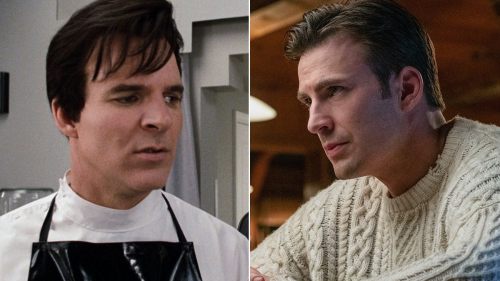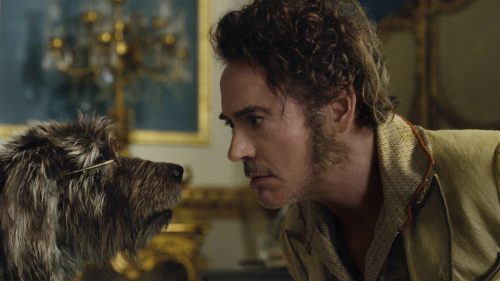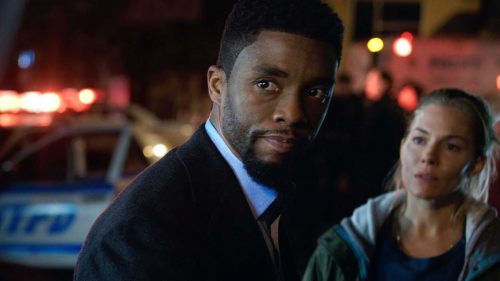CAPTAIN AMERICA: CIVIL WAR Review: A Total Triumph
Captain America: Civil War isn’t just a great Marvel movie, it’s a great movie. And that greatness - which is dependant in part on the groundwork laid by 12 previous movies - is the final proof of the concept that Marvel Studios first tried out in Iron Man back in 2008. It’s the film that proves the shared universe concept isn’t just cool, and isn’t just a great marketing idea but that - when used right - it creates a kind of gripping, resonant longform storytelling that no one else has ever accomplished on this scale. Civil War isn’t great despite being the third Captain America and thirteenth overall Marvel movie - it’s great because of those things.
It’s also great because of the combination of Joe and Anthony Russo, directors, and Christopher Markus and Stephen McFeely, screenwriters, who have put together a movie that just works, a movie whose epic plot has a stunning sweep, whose thematics are built on solid (and fertile) ground and whose tone is perfectly controlled from scene to scene, allowing the movie to contain some of the most joyous big screen spectacle that you’ll see this year but also feature some absolutely heartbreaking scenes that are emotionally harrowing. They made a movie that is an action spectacle that takes the time to ponder the meaning of responsibility, they made a superhero movie that is about the subtle betrayal of differing ideologies and they made a summer popcorn movie that examines the meaning of loyalty, of honor and the true cost of revenge.
Also they made a movie where Spider-Man fights Giant Man. (Swipe for the spoiler)
Picking up after the events of Age of Ultron, Civil War finds Captain America leading his new team of Avengers on a scrappy mission to stop villain Crossbones, who has been flagrantly knocking over police stations in broad daylight. This time his goal is an Infectious Disease Lab, and he’s after a bioweapon. After an awesome action sequence showing these new Avengers as a lean, mean, co-operative fighting machine something goes terribly awry and an explosion tears a hole in a building, killing dozens. The Scarlet Witch is, in a way, responsible for the disaster.
For the world it’s the last straw. After the messes in New York, Washington DC, London and lately Sokovia it seems as if The Avengers are a wrecking crew, saving the world - but at what cost? 117 member states of the United Nations get together to pass the Sokovia Accords, a framework in which The Avengers will no longer be a private group but rather a UN directed task force. But not all of The Avengers think this is a great idea, and a schism begins to grow.
Meanwhile, a mysterious man named Zemo is hunting down Hydra agents, seeking information about a hit The Winter Soldier performed in 1991.
I won’t give away any more of the plot. What’s important is that the film builds its conflict, escalating smartly and allowing each character to make decisions that feel totally organic, especially after almost a decade of adventures. They aren’t the decisions you would have expected them to make back when they were first introduced, but that’s part of the magic of the longform storytelling on display here - these characters have demonstrably changed over the course of all these movies. Marvel isn’t resetting these characters at the end of every adventure; what came before truly matters.
The conflict escalates slowly. First it’s words. Then a scuffle, and another. A desperate attempt to reason with the other side. Contingency plans by both groups come into play during a massive superhero battle royale that is unlike anything we have ever seen in these movies before; it’s the closest the cinema has had to one of those amazing double page splash spreads of brightly colored adventurers crashing into one another, a miraculous example of imagination sprung fully to life. And then, finally, it’s a one on one fight that is among the most brutal, the most difficult and the most heartbreaking in any film of the genre. Captain America and Iron Man, characters whose arcs have, over the course of these movies, brought them past each other and left them swapping places, have a final fist fight that actually hurts to watch for one simple reason:
They’re both right.
This is the part I have to stress more than anything else. Besides all of the gymnastics the Russos are doing in Civil War - servicing the arcs of a dozen players (and EVERY Avenger gets an arc), creating thrilling action sequences, setting up new characters for their own movies, laying the groundwork for Infinity War - they also manage to create a central conflict in which both men are right. By the end of the movie, by that nasty, harsh final fight, that conflict has transcended the ideological and become emotional in unexpected ways, but you still have the same feeling: both of these guys are right. And you would like for them to stop fighting now, please. But, as The Winter Soldier wearily intones at one point, “It always ends in a fight.”
It’s The Winter Soldier who provides the emotional center of the film; once Captain America’s best friend he was turned into a brainwashed killing machine. Waking up from his decades of murder, The Winter Soldier, played with the exactly correct sexy moroseness by Sebastian Stan, must find a way to live with what he has done. But he may not have a chance, as he is implicated in a terrorist attack that sends The Avengers after him, with only Cap and a few pals dedicated to proving the once and future Bucky Barnes didn’t do it. As the tensions of the Sokovia Accords forces them apart the hunt for The Winter Soldier brings them to blows.
That’s what makes Civil War a Cap movie, even as Iron Man’s arc is complex and deeply personal. Cap, the stalwart figure who has always easily done the right thing in the hardest times, finds himself taking actions that maybe are not right, that maybe are selfish. He refuses to back down even in the face of reason and logic, hoping only that when he finally gets to the finish line his instinct will be proven right. It’s an exciting shade for Chris Evans to play, a Cap who has a new level of self-doubt, a Cap who might be allowing his emotions - especially his love of Bucky - obscure his normally rigid moral compass.
In turn that’s what makes the central conflict so exciting for fans who have been along for the ride since 2008 - as Steve finds himself chasing his own interests (with the hope that they are, in the end, everyone’s interests), the usually selfish Tony Stark is working hard to bring responsibility to the world of The Avengers. What’s more, he doesn’t want to fight Cap - his whole goal is to bring the brewing conflict to an end, even as Cap continues escalating things as he attempts to aid Bucky. This is the exact opposite of where we saw Cap and Iron Man in the first Avengers, but it feels completely right for the characters now.
I don't know that we've ever seen Robert Downey Jr bring this level of gusto to playing Tony Stark. Downey is exploring a lot of dark emotions here, with grief and guilt up front, and he doesn't default to Tony's usual snark. He's raw in a way that we perhaps haven't seen in this, his new era of stardom. Civil War reminds us that before Robert Downey Jr was a movie star he was a great actor, and this movie gives him a chance to prove that he still is.
Even as the movie stays centered on the trio Steve/Bucky/Tony trio and their conflict, Civil War manages to bring in a plethora of Marvel heroes whose presence feels anything but superfluous. The Black Panther, played regally fierce by Chadwick Boseman (who brings a raging quiet that sets T'Challa apart from the wisecracking heroes around him) not only has a strong reason for being in the movie, but his arc is deeply tied in with what’s happening with Tony, Steve and Bucky. What’s more, his arc is fully connected to the larger thematics of the film.
As are the arcs of Vision and Scarlet Witch; Elizabeth Olsen finds a new level to Wanda Maximoff in this film, and I found the fullness of her story to be even richer than that in Age of Ultron, in which she was ostensibly a main character. Meanwhile Paul Bettany’s Vision - trying to be human by wearing normal clothes around the Avengers base - has a story as thematically appropriate as anyone else, as he discovers the ways his newfound emotions can impact his own decision-making. Neither story overwhelms the main plot but rather complement it perfectly, with Wanda especially standing in as the character who represents the larger threat of enhanced humans in the Marvel universe.
By the time the story turns to Spider-Man, introduced as a teen in Queens, New York, I worried that the cameos and appearances by other heroes had finally spun the whole film out of control. I was willing to accept it, as Tom Holland makes a perfect Peter Parker (and later in the film makes for the best screen representation of Spider-Man), but I didn’t have to worry - the Russos deftly tie Spidey into the movie’s themes by having Peter give Tony Stark a modified version of the ‘With great power’ speech. It’s brilliant writing - just as you think bloat has consumed the movie Civil War proves that every element, every move, every character is in service of a larger goal. Everything is in service of the story and the themes, and it’s all handled masterfully.
While the movie is full of juicy character stuff and grand emotional beats it’s also got some incredible action. The action set pieces evolve, so that while the first fight will remind you of the action in The Winter Soldier the final battle stops to have a moment of awesome slo-mo majesty; over the course of the movie the Russos move from the sudden impact school of shaky cam and quick editing towards something that is more like the grand, operatic fighting you want from a big comic book. Which isn’t to say they go deep into unmotivated CGI camera moves; every set piece keeps a grounded point of view - essentially the Russos drag massive superhero battles into their aesthetic.
I am not overhyping it when I say that the airport battle in Civil War is the best I have ever seen in a superhero movie. The scale is big, with a dozen heroes facing off, but what’s more it all works - this doesn’t feel like someone threw the characters up in the air and saw where they landed but rather like every beat and every interaction was carefully put together. Heroes pair off in ways that make sense, and the Russos are careful to make sure that some of the funnier, lighter characters - those will lower emotional stakes in the story - interact in just the right ways with the characters whose stakes are heavy. There is humor and tragedy in the course of the battle, and every character fights and behaves in a way consistent with who they are. It’s remarkable, especially in the way the Russos manage to use the action as a way to advance the story. The airport battle is great not just because the action is exciting, imaginative and well-designed but because of the way the characters themselves interact and bounce off each other. It’s a perfect action sequence.
In fact I think the whole film comes close to blockbuster perfection. A first viewing may not make that clear - the Russos are engaging in a lot of clever misdirections based on the audience assuming they know how these movies work - but a second viewing shows that Civil War is an expert piece of storytelling, one that is is littered with great actors doing extraordinary work as great characters. There are nits to be picked - I like Henry Jackman, but his score here does little for me, for instance - but as a whole Civil War is the ideal for how these movies should be - smart, tightly plotted, emotionally resonant and filled with awesome, ass-kicking action scenes.
This is it - the peak of the superhero movie shared universe. Captain America: Civil War is a tight action thriller that works on its own, but when taken as the latest chapter in an unprecedented experiment in longform storytelling it’s a brilliant chapter, one that makes everything that went before seem better if only because it was all leading to this pinnacle.
Buy your copy of the Captain America: Civil War issue of Birth.Movies.Death magazine here!



